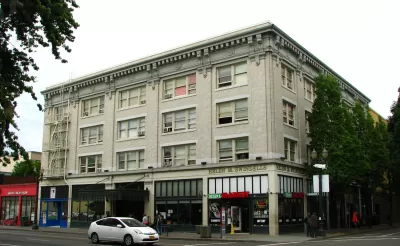Popular in the early 20th century, the rooming house fell out of favor, with the type now banned in many cities. With no end to the housing crisis in sight, cities are rethinking their regulation of this affordable housing option.

Single-room occupancy housing (SROs), which in the 1950s made up 10 percent of New York’s housing stock, could make a comeback as the housing crisis forces Americans to reconsider housing options that have fallen out of favor, writes Jake Blumgart for Governing.
Blumgart provides some background: “In 1955, New York City banned the new construction of SROs in the city. Zoning codes everywhere were tweaked to discourage anything but single-family residences. By one estimate, 1 million SRO units were lost between the 1970s and the 1990s.”
With the city receiving 500 complaints about illegal single-room occupancies each year, the demand for rooming houses is palpable in Philadelphia. One city councilmember wants to reverse that trend, calling on the city to “legalize single-room residences in all multifamily and commercial zoning districts.”
The bill isn’t without its critics in the council. “Multiple council sources have told Governing that three district councilmembers planned to introduce amendments to Green’s bill that would carve their neighborhoods out of his legislation. The bill still hasn’t been scheduled for a hearing, and council will soon break for the summer.”
Former head of Philadelphia’s Department of Licenses and Inspections (L&I), Dave Perri, has been advocating for zoning reform since 2018, when a fire in an illegal rooming house killed three people. Perri wants to see rooming houses allowed in all neighborhoods, arguing that single-family zoning no longer fits people’s needs. “He points to more single people living alone than in the past, overcrowded multi-generational households, and non-traditional family formation as pressures on the existing legal paradigm.” Single-room occupancy can fill a gap in the affordable housing supply and provide a lifeline for low-income renters.
FULL STORY: SRO Housing, Nearly Zoned Out of Existence, Could Re-Emerge

Planetizen Federal Action Tracker
A weekly monitor of how Trump’s orders and actions are impacting planners and planning in America.

San Francisco's School District Spent $105M To Build Affordable Housing for Teachers — And That's Just the Beginning
SFUSD joins a growing list of school districts using their land holdings to address housing affordability challenges faced by their own employees.

The Tiny, Adorable $7,000 Car Turning Japan Onto EVs
The single seat Mibot charges from a regular plug as quickly as an iPad, and is about half the price of an average EV.

Seattle's Plan for Adopting Driverless Cars
Equity, safety, accessibility and affordability are front of mind as the city prepares for robotaxis and other autonomous vehicles.

As Trump Phases Out FEMA, Is It Time to Flee the Floodplains?
With less federal funding available for disaster relief efforts, the need to relocate at-risk communities is more urgent than ever.

With Protected Lanes, 460% More People Commute by Bike
For those needing more ammo, more data proving what we already knew is here.
Urban Design for Planners 1: Software Tools
This six-course series explores essential urban design concepts using open source software and equips planners with the tools they need to participate fully in the urban design process.
Planning for Universal Design
Learn the tools for implementing Universal Design in planning regulations.
Smith Gee Studio
City of Charlotte
City of Camden Redevelopment Agency
City of Astoria
Transportation Research & Education Center (TREC) at Portland State University
US High Speed Rail Association
City of Camden Redevelopment Agency
Municipality of Princeton (NJ)





























